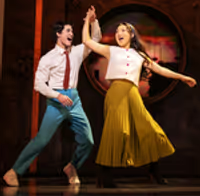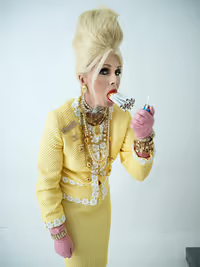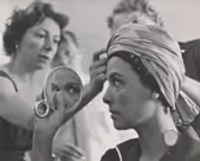You're tasked with fixing/overhauling DEVIL WEARS PRADA. How do you do it?
#25You're tasked with fixing/overhauling DEVIL WEARS PRADA. How do you do it?
Posted: 8/8/22 at 1:25pm
At least we didn't get a ballad called "Devil Wears Prada" a la "Sister Act" or "Legally Blonde."
And at least we didn't get a big ballad called "That's all."
LB still drives me nuts because she says "I'm legally ... blonde" as if we're suppose to know what that even means? Otherwise, pretty song.
I think there's def. a great musical in there. I think just over haul the script and keep it closer to the movie/book.
Dolly80
Broadway Legend Joined: 5/15/11
#26You're tasked with fixing/overhauling DEVIL WEARS PRADA. How do you do it?
Posted: 8/8/22 at 5:18pm
Bin everything and start again. Or just bin everything and move on.
#27You're tasked with fixing/overhauling DEVIL WEARS PRADA. How do you do it?
Posted: 8/8/22 at 5:43pm
RippedMan said: "LB still drives me nuts because she says "I'm legally ... blonde" as if we're suppose to know what that even means? Otherwise, pretty song"
Professor Callahan at point in the show refers to Emmett and Elle as Ratty Corduroy and Legally Blonde.
IHeartNY2
Stand-by Joined: 4/14/17
#28You're tasked with fixing/overhauling DEVIL WEARS PRADA. How do you do it?
Posted: 8/8/22 at 6:12pm
Agree with the person in the other thread who said this should be styled like American Psycho.
#29You're tasked with fixing/overhauling DEVIL WEARS PRADA. How do you do it?
Posted: 8/8/22 at 6:31pm
Hire this guy to play Miranda:
https://www.tiktok.com/@julianburzynski/video/7129630247292587307
akhoya87
Featured Actor Joined: 4/22/18
#30You're tasked with fixing/overhauling DEVIL WEARS PRADA. How do you do it?
Posted: 8/8/22 at 6:43pm
I haven't seen it (and may never get to see it), but if this is a faithful/straight adaptation of the movie, I'd dump that approach. Make this a Miranda Priestly origin story - how did she become Miranda? Seems like Beth Leavel is criminally underused. The show can be a prequel to TDWP and intro right into the movie.
Rainah
Broadway Star Joined: 11/24/16
#31You're tasked with fixing/overhauling DEVIL WEARS PRADA. How do you do it?
Posted: 8/9/22 at 9:47am
I think you need to throw it out and start over. I would go for a new musical "inspired by Devil Wears Prada" a la Pygmalion to My Fair Lady. A new name, rework the plot beats to fit a musical and the language of theatre, be free from the need to include all the iconic lines to please fans.
Hype it up as being inspired by the movie, for sure, but make it clear that it's not a 1:1 translation (which do not work, because film is a different medium).
Owen22
Broadway Legend Joined: 2/24/11
#32You're tasked with fixing/overhauling DEVIL WEARS PRADA. How do you do it?
Posted: 8/9/22 at 11:32am
First off, there is no problem with the idea of the Devil Wears Prada as a musical. At least any more than any other property or sounce material being adapted. It's always how said source material is treated. Anything can be a popular musical or at least a critically acclaimed musical if treated correctly. Right now these big commercial movies being turned into big commercial musicals are basically edited screenplays with some songs thrown at them. With a bunch of corporate writers, who have nothing really invested in the storylines except as work for hires. Not that work for hire is a bad thing-- a lot of great musicals were written as work for hires. But that was when we had a golden age, when we had a host of songwriters who could write tunes and lyrics. We don't have that anymore besides, maybe, Lin-Manuel. David Yazbeck maybe, at least his (admittedly not very good) Tootsie was rethought as a musical. Definitely not Pasek and Paul,whose Christmas Story musical reeked of the same work for hire songwriting ethos. Evan Hansen had half a great score but you can tell that they were invested in their story. Maybe if you let Shaina Taub (who has promise) write the entire score. She could find something in it that would appeal to her if allowed to fully conceive the score herself? I don't know but from here on, along with finding great songwriters, adapters should not guess how said adaptation would please an audience. Write an adaptation that isn't what they think the audience wants but an adaptation that would surprise them. And maybe find a director who knows how to direct a musical. Now that Luke (& Juliet) Shepherd is directing for Broadway hopefully he will find a permanent home here. That guy can direct a musical!
Updated On: 8/9/22 at 11:32 AM#33You're tasked with fixing/overhauling DEVIL WEARS PRADA. How do you do it?
Posted: 8/9/22 at 2:03pm
Besides (and including) things like the basic faults of the score and design and what's been mentioned:
1) Explore how Miranda is outdated, and why her cruelty is toxic beyond the fact that being mean to people is bad. At the end of the show, she saves her job by screwing over Nigel and sings about how you have to be ruthless to stay on top and not be just a nobody, etc. I would love for there to be either more of a sense that this a Pyhrric victory, or that she's right, in the sense that she's won and will continue winning to the detriment of the rest of us. One of the two would be a proper conclusion and provide some kind of message.
2) Identify and detail what makes Andy tick. She's always been a vague character, and she's vaguer than ever in the musical. Part of this is that the roman a clef element somewhat precludes insight, but also that they've simplified her in the first section to a doofus caricature of a liberal college graduate, so basically everything she says is a joke. This means we don't really care about what she actually wants, and it makes her gradual makeover generic, as we have nothing specific to contrast this new behavior with.
She should have a clear purpose for taking the job besides wanting to make rent, such as believing it'll be good experience or that she can make some kind of change, and then we can follow that idealistic purpose being warped. If she doesn't, then work the angle that you can't just be an innocent bystander in an ugly system, and perhaps connect that better to her ideals at the start, so that, in the end, we can understand what she's learned.
3) Narrow the focus to the Runway offices. This not only removes all the filler business with her friends/partner about how she's changing (we know she's changing, we're the audience, we're watching her change) but creates a more high-pressure, locked-in environment and gives us more opportunities to develop the relationships between Andy, Miranda, Nigel, and Emily.
4) Make Emily an actual person. Right now, she's entirely comic relief, so when she literally slapsticks her way out of the Paris gig it doesn't feel like a dramatic turn where Andy takes advantage of a situation in a way that's newly vicious, which would make a perfect act one closer. We should understand that Andy is giving herself over to a new, unsettling habit of cruelty, and we're poised to see how that plays out in the second act. As it is now, she just kind of bumbles into it (well, Emily bumbles into it for her). She says "Emily wants to go to Paris! I can't do this to her!", to which Miranda says "I guess you're not serious about your future at Runway", and Andy replies, "Ok. I'll go", before leaving to tell Emily. All the thrill of canned beets.
5) Give us a bit more to chew on with Nigel. He's an interesting character, and he's given a somewhat promising song in the second act about being closeted in Kalamazoo and then finding himself when he discovers fashion magazines, and that he puts up with the pressures of the fashion world because he wants other little queer kids to see what he saw in them. It's kind of a shallow song, made shallower by the fact that a lot of it feels oddly jokey, but there's a nugget there that could be explored to further highlight the tragedy of Miranda's betrayal and perhaps even point him up as being misguided, blinded, or misled. You could even develop his character to highlight the fact that, as far as we can tell, he doesn't really have an inner life that we can see - a suggestion that there's more to being queer than the cultivated media image, for example, or that Miranda's never given him the space to actually develop as a person. He sings that he's "seen, finally seen", but what happens after you're seen? We've moved past the gay sidekick as representation, so there needs to be more to Nigel.
6) Figure out Miranda's singing voice. As I noted in the other thread, the Cerulean monologue is a good example of the unsatisfying half-measure they've taken with her. She recites the monologue basically word-for-word from the movie, but she's given a chorus backup. In the film, this is an icy, thrilling demonstration of Miranda's steely mastery not only of the industry that she's a leader of, but of her ability to ruthlessly read and strip other people of their pretenses. It's a moment that everyone knows, and will be anticipating, so going halfway by half-burying it under a burbling chorus only takes away from its power because it's only halfway to a new take on the monologue, which is distracting. It never takes off into its own thing, which it could if it were thoroughly reconfigured into an actual song, but it also doesn't maintain the same power as if they'd just had her do the monologue as is, with no accompaniment. Some might consider the latter disappointing, but it could also be seen as a challenge for the actress.
Excepting her sudden (and somewhat muddled) burst into belting in the last act, the rest of her singing is in a kind of typewriter-lesson staccato that doesn't quite qualify as patter and could use tightening (there's a lot of weird scansion in this show's lyrics). We could either use more development of her character as a singer before she barnstorms, or we could see her entirely as a non-singing character and then her big number at the end is given extra development to transform her before our eyes into a character that sings, in a true grand finale blowout.
7) Do something about Paris. It's not 1955, we don't need goofy accordion music. This could be a moment where Andy realizes that Paris isn't a vacation, it's a even higher-stakes, more suffocating environment. Also, the "in your twenties" song is basically meaningless nonsense. If we're going to have a song where the guy she has a fling with seduces her away from her work, it should have some relevance to the characters. What can he offer her, in this moment, that she doesn't have, and secretly wants? Can he play to her in a way that we know she wants to be played to, and in a way that creates tension by taking her away from something important? Perhaps what she learns from being taken advantage of can influence the speech she writes, making it better, which then ironically assists Miranda in sealing Nigel's doom.
8) We need more from the post-speech confrontation between Miranda and Andy. It doesn't need to be a catfight brawl, just more of a back and forth. You could demonstrate here that Andy has not only become a great, if ruthless, assistant, but essentially a potential equal to Miranda, only that she's seeing a clear choice to use that potential for a better cause. I don't think we got this in either the film or the musical, both of which fall back on letting Andy essentially stumble upwards, rather than actively compromise herself.
We also need more from Andy's post-confrontation climax number. There's no revelation in it for the audience of what she's learned besides that she needs to do things for herself, and not for others, which is the kind of thing you see on inspirational plaques from Bed Bath and Beyond. I don't want to spend two and a half hours in a theatre to learn that I need to "be me for me".
It probably seems like a lot of these notes are aiming for a show that's tenser and more dramatic than might seem necessary, but I feel like it's a better option than going in the opposite direction and making it fluffier. Great musicals are all about tension (and release of tension), and there's so much potential for it in this work that goes unexplored. We need those moments where the entire audience stops breathing and leans forward, so that we can get the flood of endorphins when the tension breaks.
That's all (lol).
VintageSnarker
Broadway Legend Joined: 1/30/15
#34You're tasked with fixing/overhauling DEVIL WEARS PRADA. How do you do it?
Posted: 8/9/22 at 4:31pm
I'm with you entirely, Charley Kringas Inc. The set up and payoff you want isn't quite there and the musical should be a chance to get it right.
Also, I finally remembered this...
https://www.youtube.com/watch?v=PZZkBn3d1nU&ab_channel=AndrewByrne
#35You're tasked with fixing/overhauling DEVIL WEARS PRADA. How do you do it?
Posted: 8/9/22 at 7:52pm
In watching the movie, I felt like Andy was just a side character that got involved with the real story, that being the survival of a woman in one of the most high profile jobs in the world. Go with that instead of turning it into a Cinderella story, and tone down the abuse angle. Also, fire the costume director and choreographer.
#36You're tasked with fixing/overhauling DEVIL WEARS PRADA. How do you do it?
Posted: 8/9/22 at 8:06pm
The music is tragic. Elton John is known for not taking suggestions. He won't fix this. His ego won't let him.
Start from scratch. This show is DOA.
#37You're tasked with fixing/overhauling DEVIL WEARS PRADA. How do you do it?
Posted: 8/9/22 at 10:54pm
Impeach2017 said: "In watching the movie, I felt like Andy was just a side character that got involved with the real story, that being the survival of a woman in one of the most high profile jobs in the world. Go with that instead of turning it into a Cinderella story"
But that's the thing with the movie: we see Miranda almost exclusively through Andy's eyes. This is Andy's story, not Miranda's, and part of the magic of it is how much Miranda looms over the proceedings with somewhat limited screentime. A Hannibal Lecter situation. You could try to make Miranda the central character, but then might run into the problems of the Silence of the Lambs sequels...or, god forbid, and origin story.
Sometimes a character like that is best as a flavor, not a main dish.
#38You're tasked with fixing/overhauling DEVIL WEARS PRADA. How do you do it?
Posted: 8/10/22 at 5:03am
ErmengardeStopSniveling said: "Impeach2017 said: "In watching the movie, I felt like Andy was just a side character that got involved with the real story, that being the survival of a woman in one of the most high profile jobs in the world. Go with that instead of turning it into a Cinderella story"
But that's the thing with the movie: we see Miranda almost exclusively through Andy's eyes. This is Andy's story, not Miranda's, and part of the magic of it is how much Miranda looms over the proceedings with somewhat limited screentime. A Hannibal Lecter situation. You could try to make Miranda the central character, but then might run into the problems of the Silence of the Lambs sequels...or, god forbid, and origin story.
Sometimes a character like that is best as a flavor, not a main dish."
you're probably right, I'm just throwing things out there
#39You're tasked with fixing/overhauling DEVIL WEARS PRADA. How do you do it?
Posted: 8/10/22 at 8:58am
What’s missing is a creative force that can say “no” to Elton John, or a project philosophy that isn’t Elton John oriented. Remember, when you push back against his excesses he can rewrite and revise and create great work; compare his Billy Elliot demo to the finished product. He just needs someone powerful enough or confident enough to push back and collaborate actively rather than passively. And god knows he won’t want it…
#40You're tasked with fixing/overhauling DEVIL WEARS PRADA. How do you do it?
Posted: 8/10/22 at 10:34am
What’s missing is Elton John, full stop. Having a composer who cannot physically be present and on-site for the full preview period and the rehearsal period leading up to it and who knows how long after it means you functionally cannot make meaningful changes to the show. It doesn’t matter that he’s only written the score- nothing else about the show can change if the score cannot change. You’re just rearranging deck chairs on the Titanic.
#41You're tasked with fixing/overhauling DEVIL WEARS PRADA. How do you do it?
Posted: 8/10/22 at 2:46pm
Can they scrap the score and throw in Elton's greatest hits.
BdwyFan
Featured Actor Joined: 3/1/10
#42You're tasked with fixing/overhauling DEVIL WEARS PRADA. How do you do it?
Posted: 8/10/22 at 4:47pm
People want the film. Stick to the film and Miranda with gray/white hair. A Meryl doppelgänger is needed!
or consider a drag queen as Miranda. 😜
#43You're tasked with fixing/overhauling DEVIL WEARS PRADA. How do you do it?
Posted: 8/10/22 at 5:51pm
John not being around to work on the score makes me think of all the stories about Sondheim working himself to shreds in the weeks leading up to and through previews.
#44You're tasked with fixing/overhauling DEVIL WEARS PRADA. How do you do it?
Posted: 8/11/22 at 12:10am
I know I said this story doesn't sing, BUT I can't stop thinking about what I'd do. I do think the bones are there if you work from the book. The movie adapts the book in a way that is very specific to the medium of the film. What this needed was for somebody to secure the rights from Fox, and then throw out the film script immediately. My biggest thought is that this needed to be a period piece. I don't mean early 2000s either. I'm talking 70s or 80s.
Videos









